

The Catholic Patriotic Minute: Father William Corby
Catholics For Catholics Special Edition | July 28th, 2025
Father William Corby: The Esteemed Catholic Chaplain of the Civil War
Known most for the general absolution he gave at the Battle of Gettysburg in July 1863, Father William Corby fully lived out his roles as priest, professor, army chaplain, and university president. In the classroom, on the battlefield, and on the altar, Corby’s aim was to save souls.
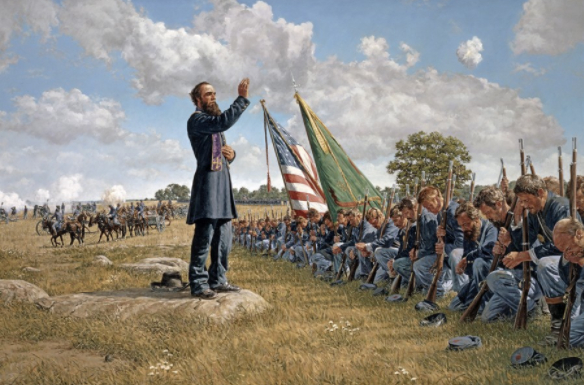
On October 2, 1833, William was born in Detroit. Once he reached the age of sixteen, William joined the real-estate business of his Irish father, Daniel, who assisted in founding and building churches throughout Detroit. However, four years later, Daniel sent William to the newly-founded University of Notre Dame, which at the time was primarily a boarding school for young boys as well as a small university. Here, Corby discerned the priesthood and would be ordained in 1860. By 1861, he became the Prefect of Discipline and the Director of the Manual Labor school, as well as the pastor of St. Patrick’s parish nearby.
As the Civil War broke out in 1861, Father Sorin, the founder and first president of Notre Dame, understood the dire need for Catholic chaplains in the Army of the Potomac. About two hundred thousand Catholics made up ten percent of the Union army, and yet there would only be about fifty-three Catholic chaplains to serve them. Father Sorin sent seven priests from Notre Dame to be army chaplains, and one of these priests was Father Corby. Corby attributed his drive behind volunteering as a chaplain to his patriotism and his “zeal for the salvation of those destined to fall in the pending stupendous contest between two powerful opposing armies.”
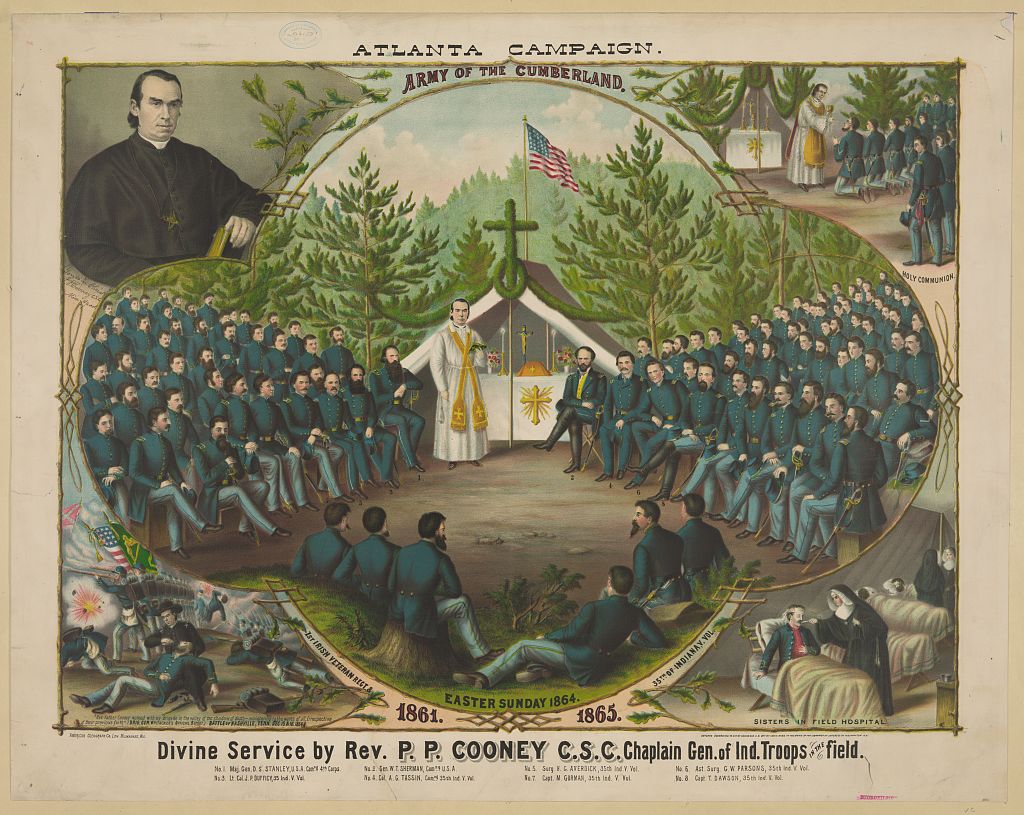
Travelling by train from Chicago to Washington, Father Corby found the nearest Catholic church, old St. Peter’s on East Capitol Hill, and the priest there helped him find his way to the Irish Brigade, who were near Alexandria, Virginia. Recruited and commanded by the Catholic and Irish General Thomas Francis Meagher, the Irish Brigade consisted of mostly Catholics from New York City. Labelled as the “Headquarters of the Church in the Army of the Potomac,” the Irish Brigade had the most Catholic chaplains. By the end of the war, four thousand of the Irish Brigade died, which made this particular brigade the one with the most deaths. The Irish Brigade fought in all major battles that occurred in the eastern theater of the Civil War, starting with Bull Run and lasting till Lee’s surrender at Appomattox.
As a chaplain, Father Corby would offer Mass and provide Confession to the Catholic soldiers, especially before battles. He would even be present near the battles to offer confession to soldiers, as they fell back with life-threatening wounds. His care to the spiritual health of his soldiers was notably clear before and during the Battle of Antietam. Preceding the battle, Corby made sure his soldiers could attend Mass and Confession. Under the command of General McClellan, the Battle of South Mountain broke out two days before Antietam. Corby recounted that, on the battlefield, “when I found men still living, [I] did what I could for them. If [they were] Catholics, I heard their confessions, and if [they were] Protestants, [I] baptized them, as individual cases required.” At Antietam, on September 17, 1862, the single bloodiest day of the Civil War, Corby rode alongside the line of the Brigade, guiding them to recite an Act of Contrition and gave them absolution, and then the chaplain charged into battle General Meagher. Hearing the confessions of dying soldiers while bullets fly past might seem like a foolish situation for a pagan or protestant, but it was the single remedy the soldiers needed before their judgement.
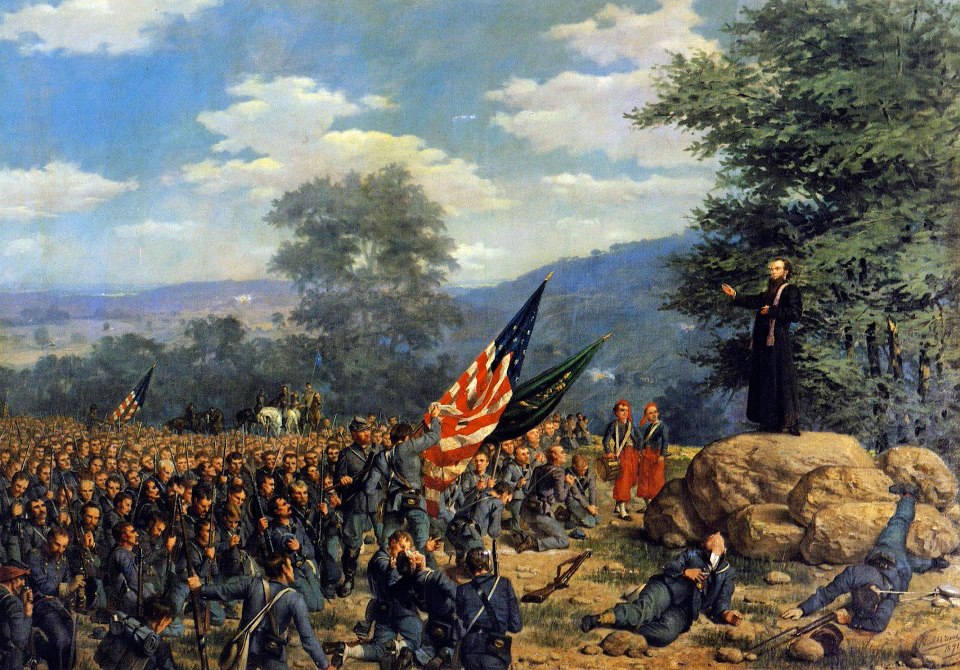
Father Corby’s dedicated mission to save souls is often remembered through his presence at the Battle of Gettysburg, the turning point of the Civil War for the Union and the deadliest battle of the War. Before the Irish Brigade joined the battle, Father Corby stood upon a boulder in front of his men, repeating his pre-battle habits of praying an Act of Contrition with the soldiers and giving them absolution. Later, Father Corby recalled from this day that, “[a] more impressive scene, perhaps, never took place on any battlefield.” In his memoir, he remembered noticing that
all, Catholic and non- Catholic, officers and private soldiers showed a profound respect, wishing at this fatal crisis to receive every benefit of divine grace that could be imparted through the instrumentality of the Church ministry. Even Maj.- Gen. Hancock removed his hat, and, as far as compatible with the situation, bowed in reverential devotion . That general absolution was intended for all -in quantum possum —not only for our brigade, but for all, North or South, who were susceptible of it and who were about to appear before their Judge.
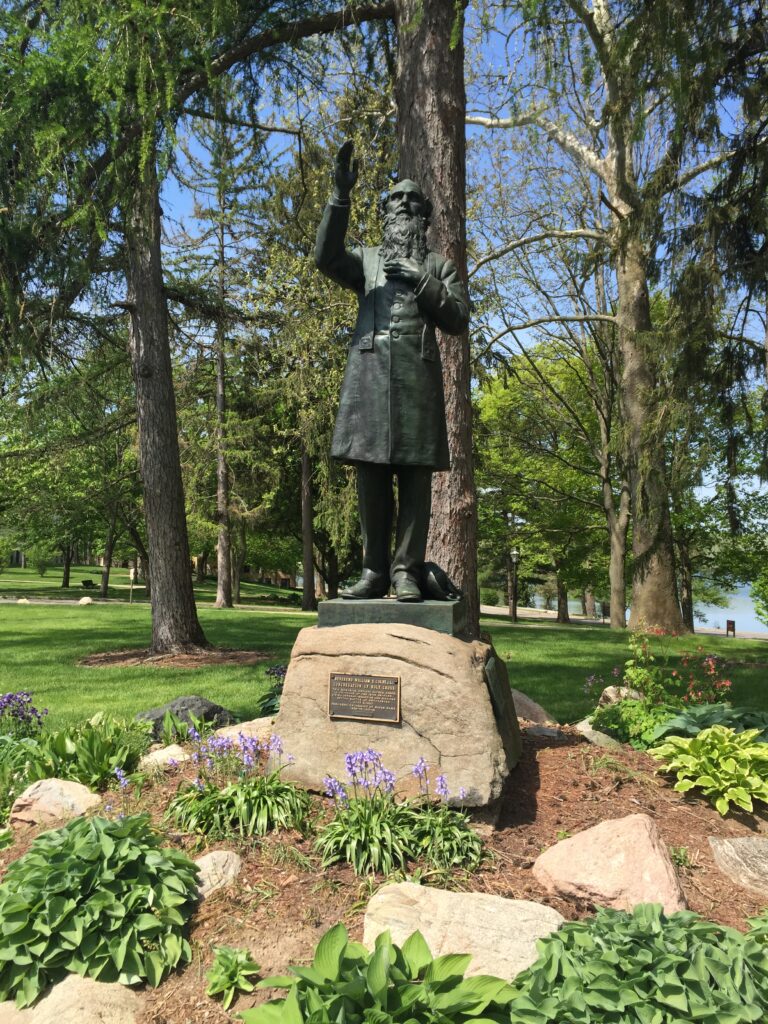
Father Corby’s mission to reconcile more souls with God the Father is honored by two duplicate statues, one at Gettysburg and the other at Notre Dame, created by the artist Samuel Murray. The statue resembles Father Corby, on a boulder, with a hand raised for absolution. At the dedication of Father Corby’s statue at Gettysburg in 1910, a speaker noted that, although numerous acts of physical bravery and heroism from the Civil War had been commemorated, “for the first time a monument has been erected to perpetuate the memory of a deed done directly for the glory of God and the salvation of the human soul.”
After the war in 1865, Father Corby returned to Notre Dame to serve as vice president and then president from 1866 to 1872 and then from 1877 to 1882. During his presidency, Corby opened the law school in 1869, initiated construction of the church, which is now the Basilica of the Sacred Heart, and then became known as the “Second Founder of Notre Dame” because he helped rebuild the university campus after the fire in 1879. Before he died in 1897, Father Corby wrote the bestseller Memoirs of Chaplain Life in order to remind Americans of the Catholics’ service and sacrifice in the Civil War. He dedicated a whole chapter on the injustice directed at Catholics nearing the turn of the twentieth century in America, when those of other religions were proclaiming that Catholics inhibited American liberty. Father Corby pointed out that the Catholic French helped America become free during the Revolutionary War and that the Catholic Irish fought for the freedom of all Americans in the Civil War. According to Father Corby, the United States simply could not unite in freedom without securing Catholic Americans’ rights and honoring Catholic forefathers.
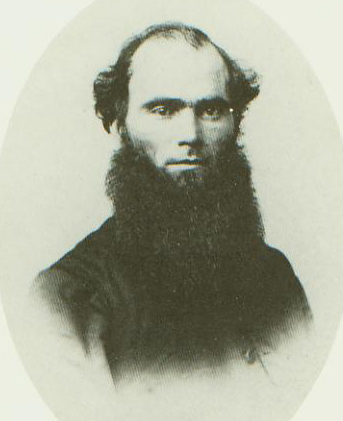
Often, when Americans speak of the Civil War, stories of glory on the battlefield are retold. But, there is something about Father William Corby’s story that people find extraordinary, whether you are a historian, or a person who stumbles upon one of his statues, or even a viewer of the 1993 movie Gettysburg. His soldiers from the Irish Brigade found him quite extraordinary, as they nominated their “Fighting Chaplain,” for the Medal of Honor in 1893. Even though the War Department did not award Corby with the medal, his soldiers honored Corby with a chalice. A chalice, rather than a medal, was quite fitting for Corby. By risking his life to provide the sacraments to soldiers before their deaths, Father William Corby pursued the salvation of souls solely for the glory of God, not worldly honor.
For more Catholic Patriotic Minutes, visit CATHOLICUSA.COM
Save and Share This Catholic Patriotic Minute!
